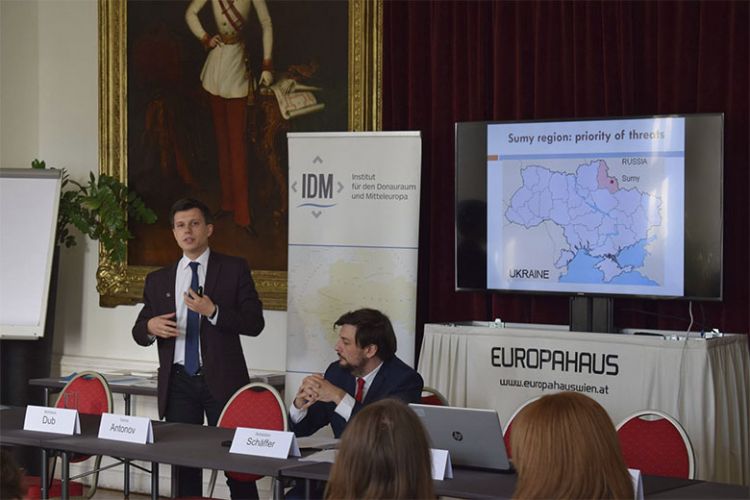Research On National Resilience And Regional Security

Mykola Nazarov presents research results during the security conference in Vienna, Austria
Research Centre for Regional Security is a research centre in Sumy State University established with the support of NATO. The main purpose of the Center is to unite scientists, government officials, volunteers and NGOs to create an expert environment to research and analyze key security challenges in Eastern Europe.
Director of the Center Mykola Nazarov represents Ukraine as a national expert in HORIZON 2020 Programme committee "Safe societies - protection of freedom and security of Europe and its citizens". Representation in this program enables the Center to offer its vision of the largest research program of the European Union in the field of security. In 2021, the next program begins - Horizon Europe, in the development of which a representative of the Center also took part.
In research activities Center focuses on such topics as:
- formation and strengthening of national resilience in Ukraine, focusing on the experience of European countries;
- EU and NATO policy in the field of strategic communications and security;
- analysis of the process of European and Euro-Atlantic integration of Ukraine;
- psychological, informational and cognitive resilience: preconditions for their formation;
- creation of a national resilience index for further comparative analysis.
In 2020 Centre signed an institutional contract with NATO Public Diplomacy Division and made a commitment to conduct research on regional security as well as the level of NATO support in Ukraine; provide information and advisory support for researchers, students and all, who is interested in security and NATO.
As a result of the Center's work in 2020, a total of 49 public events were organized (both online and offline): 9 roundtables, 1 conference, 8 workshops, 28 lectures, 2 essay contests, 1 sociological survey. The events were attended by 1,020 students, 55 journalists, 8 diplomats, 27 experts. In total, 800 media reports on NATO and 1100 publications of the Center were distributed throughout the year. Also, experts of the Center worked as lecturers at the Center for Training of Civil Servants of Sumy Regional State Administration. During the year, 12 lectures on NATO-Ukraine relations and information security were held for 520 civil servants.
The Ukrainian-Estonian research project "Resilient Ukraine"
The Estonian-Ukrainian programme Resilient Ukraine aims at developing standards for measuring societal resilience. Since 2020 Centre became a regional partner of the project. Our team conducts qualitative and quantitative research on security issues and resilience gaps in society as well as raise awareness about them on local and regional levels. Also, we organize events and study trips to Estonia and teach how to identify and mitigate societal vulnerabilities. Our online course in security in terms of communication, information and cyber is useful for ones related to sociopolitical life. Resilient Ukraine programme has been implemented by the International Centre for Defence and Security (ICDS) since 2016 with the support of the Estonian Ministry of Foreign Affairs.
Currently, research team works on developing resilience index as an expert tool for providing data-driven and methodologically tested inputs into evidence-based decision-making on improving national resilience issues in NATO allies and partner countries in order to increase the level of their situational awareness about security threats to modern societies in communication, information and cognitive domains.
Research Centre for Regional Security invites to cooperation in the declared areas, is ready for joint research, project and educational activities. We have significant experience in joint projects with the European Commission, NATO, UN, European countries. Our global goal is to shape a more resilient and safer Europe through research and give impetus to its further development.